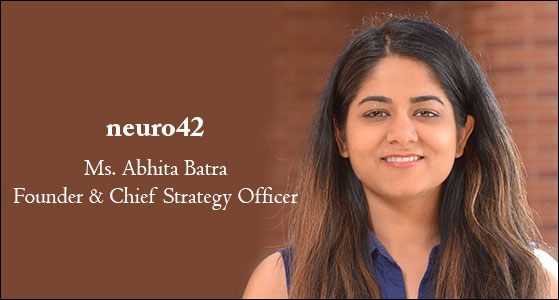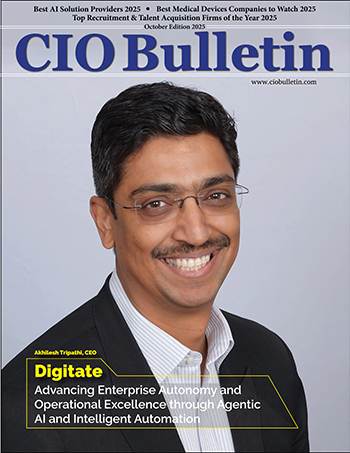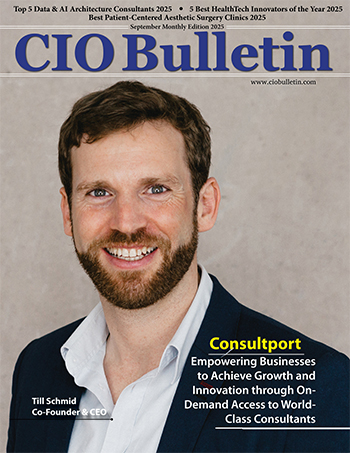50 Innovators of the Year 2022
CIO Bulletin

This decade has seen fascinating developments in the field of Neurology. New drugs, new interventional procedures, new investigations, cutting edge research and newer & faster machines have transformed the field entirely. What was once considered as more of a palliative treatment field with no hopes for cure, has been changed to an ever-expanding medical field which is advancing at breathtaking speed.
We want you to meet neuro42, Inc. a medtech Company advancing futuristic technologies for screening, diagnosis, and targeted treatment of neurological conditions. The Company is developing and commercializing a portable MRI, robotic and AI platform, backed by over 30 patents, for point-of-care imaging and interventions under live image guidance.
We had a conversation with Abhita Batra, Founder, for further details about the company
As a journalist, I find neuro42 quite striking. From the emotional branding standpoint, it has that appeal. How did you come up with the brand name? And please brief us about the history so far.
The Company founders are science fiction aficionados, and the reference to the number “42” came from “The Hitchhiker’s Guide to the Galaxy.” With our focus on neuro interventions, it was, of course, logical to go with neuro42 and build our brand equity around it.
neuro42 was founded in August’2020, and the underlying MR technology was exclusively licensed from Dr. Lawrence Wald’s lab at MGH Martinos Center for Biomedical Imaging. The technology inventors, Drs. Wald, Stockmann, and Zimmerman Cooley are co-founders along with the Company principals. Recently, neuro42 licensed a head, brain and spine robot for MR compatible interventions from the Johns Hopkins University.
Q. Could you tell us about the various services that you offer?
neuro42 is a medical technology company focused on the development and commercialization of a portable, interventional MRI, MR compatible robot and AI platform for neuro interventions. We’re proud to be aligned with some of the brightest minds in health care and medtech. Ultimately, we hope to help physicians triage patients and perform interventions for brain diseases and injuries in a more effective and patient-centered manner.
Q. What makes neuro42 unique in the diagnostics Sector? What is your company's point of differentiation?
Our focus is elevating MRI methodology, diagnosis and treatment outcomes for neurological conditions, offered at a more affordable cost than traditional MRI systems through a point-of-care shift. Every aspect of our technology, including the design of the actual system, was created with patients and providers top of mind. One example of that is how when undergoing a scan with our technology, patients don’t experience claustrophobia or hear the same loud knocking sounds associated with traditional MRI scans. That reduction in anxiety and enhancement of experience is a positive for everyone involved.
While we’ve gotten very positive feedback from all the providers we’ve spoken to, neurosurgeons are some of the most excited about what the technology can do for them. Because we are a low-field MRI scanner, we can be flexible and adaptable, incorporating robotics and artificial intelligence into the mix for more precise interventions. When it comes to the head and brain, you simply can’t be accurate enough.
Q. What does innovation mean to you? What groundbreaking and innovative methodology does your company implement for treating neurological conditions?
For us, innovation means taking bold steps in a new direction, as we envision neuro42 becoming the new standard in MRI technology in the near future; not only because of the clear advantages that it provides to physicians looking for increased levels of certainty, but also because of the myriad ways in which patient experience will be improved. Ultimately, providing cutting edge tools that help neurosurgeons save lives through accurate diagnosis and improved treatment outcomes is what we are all about.
As of now, there are no commercially available portable, interventional MRI and robotic platform designed for the head and brain—so we would be the first. We’re also unique in that our technology facilitates more than just an image. For example, we can be used intraoperatively for confirmations during and after brain tumor resection.
Unlike traditional MRI systems that are massive in size and scope, our system is compact. In fact, it’s designed to fit inside a doctor’s office if needed so that patients don’t have to be transported to a standalone imaging facility for a scan. We also don’t require the type of shielding or extensive power requirements that current systems do.
Q. Tell us about your robotic and AI-based products? How will patients be able to trust the quality of these products?
We have partnered with some of the best and brightest minds across every field. As we mentioned before, we have recently secured an exclusive licensing agreement with Johns Hopkins University for its magnetic resonance (MR) compatible robot for head, neck and spine applications, with additional non-exclusive licenses for related technologies and patents. This means that patients will be able to access the most advanced technology available in the market today, coupled with our suite of integrated data analytics, processing tools and our portable point of care MRI system. Our vision is that each patient should effectively benefit from a fully integrated, top of the line ecosystem specially designed to improve their outcomes.
Q. How do you balance the future of healthcare and consumer privacy? What considerations /risks /opportunities should we keep top of mind?
Patient privacy is of paramount importance. Data must always be handled responsibly and securely, this is one of the cornerstones of our entire philosophy. In our opinion, however, the opportunities far outweigh the risks. The life-saving potential of properly managed and utilized data sets as pertaining to a patients journey from diagnosis to post-procedural care can effectively provide physicians with an additional edge, and a much needed one when looking to achieve the best possible outcomes.
Q. How will A.I. and deep learning influence the activity of neurologists (especially) and other medical specialties and how will the digitization of healthcare impact the doctor-patient relationship?
Neuro42´s artificial intelligence engine will ultimately incorporate a full 360° view of a patient´s data to provide highly accurate images and tissue classification – including clinical baseline, MR images, tissue pathology, treatment results and procedural data – which effectively means accessing faster imaging, tissue classification, enhanced reconstruction and predictive analysis.
Given the fact that our technology facilitates more than just an image, we provide additional assistance to physicians during complex procedures. For example, we can be used intraoperatively for confirmations during and after brain tumor resection. Our technology can also be used to guide brain biopsies and enable image-guided interventions for epilepsy and PD, this helps provide an additional layer of certainty to patients, which in turn gives them and their families, more peace of mind.
In brief about the Founder
Ms. Abhita Batra is a serial entrepreneur, business strategist and advisor to several healthcare and technology startups. Abhita is Founder and Chief Strategy Officer at neuro42. She is the CEO and Director at Otomagnetics, a Company developing first-of-its-kind drug delivery platform. Abhita is the Founder and Managing Director of Advanced Biopharma Consulting, a strategic advisory firm that offers business development and commercialization services to life science companies. She is a Director at Admac Group of Companies, wherein she manages a product portfolio encompassing 150 generics. She is a co-founder and former COO of Navya, a biotechnology company developing and commercializing PHF for destruction of solid tumors. Abhita completed her Global MBA at UCLA Anderson and NUS, and has a Masters in Biotechnology with specialization in Pharmaceutical Sciences from University of Pennsylvania.

Insurance and capital markets







